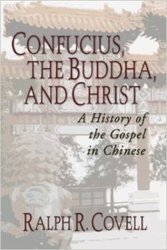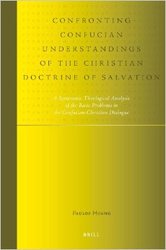
Confucius, the Buddha, and Christ by Ralph R. Covell. Wipf & Stock, 2004 (reprint, original publication date, 1986), 304 pp. ISBN-10: 1592445330; ISBN-13: 978-1592445332; paperback, $26.10 at amazon.com.
In this book, Covell tried to analyze outstanding attempts to “bring the Christian faith and Chinese culture together,” and the focus “is on the shape and nature of the message that has been preached in Chinathe gospel in Chinese. It is an intellectual history, a history of Christian ideas in Chinese garb” (xiv-xv). He also includes a discussion of the “‘paramessage,’ those symbolic signals of gospel messengers that spoke more loudly than their words” (xv).
Beginning with the assumption (in 1986) that the presentation of the gospel in China had “failed,” Covell asks for the reason, and whether missionaries “were insensitive to the Chinese context, unwilling to search for the key that would open the Chinese mind and heart?” (4).
He begins with a brief description of the Chinese “mind” which he finds to be originally, and to this day, religious, with concepts of heaven, the will of heaven, the moral meaning of life and of the universe, sacrifice and ancestor worship. Of course, the “superior” men saw religious rites as secular in meaning and purpose, useful for promoting social harmony and self-cultivation, but the masses fully believed in the spirit world behind the ceremonies. Confucianism, Buddhism and Daoism not only coexisted peacefully but interpenetrated each other so that it would be hard for the average person to define precisely which tradition he followed. The various religious “strands have been worked into an interfaith collage that has swallowed up their original roots and identity”(14).
At the same time, Chinese have always been basically humanists, seeking harmonious relationships at home, work and in society. “They have always placed primary emphasis on human interests and human relationships” (10). With the five cardinal virtues in the five key relationships as their guide, the Chinese “have always been a highly moral people” (11).
Of prime importance for the history of Christianity in China has been the assumption that fundamental loyalty must be given to the emperor as the Son of Heaven. The greatest offence is not theoretical heresy but any questioning of the supreme governmental authority.
Against that background, and in that context, Covell traces the history of the gospel in China, from the Nestorians up to about 1980. Major themes include ways in which foreign missionaries and then Chinese Christians of various types tried to express the gospel in terms and through forms which were, or were not, readily accessible to the people they hoped to reach.
He hesitates to fault the Nestorians since the reasons for their failure are impossible to discern with clarity. The Jesuits receive praise for coming as learners and in weakness, with no political power behind them, for seeking to adapt the gospel to Confucian ideas and rituals as much as possible, and for being willing to pay the price for their commitment. While he admires the heroic efforts of the early Protestant missionaries, he finds their connection with the opium trade, and with Western power in general, to be an almost fatal one with repercussions down to the present. He even dares to criticize Robert Morrison’s fateful decision to work for the East India Company, something which I think we ought to consider seriously.
Some Protestant missionaries, followed by some more liberal Chinese Protestants, tried to accommodate the Christian message to Confucian concepts and even rituals, an effort which Covell admires. He laments the lost opportunity that resulted from missionaries’ refusal to nurture the proto- or quasi-Christian notions of the Taiping rulers. Two chapters on Buddhism and Christianity provide rich food for thought.
In the twentieth century, Covell sees two trends: the “gospel of Confucian activism,” represented by those who sought to reform society, through revolution if necessary; and the “Daoist” gospel of pietism, expressed by fundamentalist and evangelical Chinese leaders who sought individual salvation, without (Covell claims) regard for changing society. The dramatic changes which have taken place since the communist revolution in 1949 are also traced with balance and overall fairness, though perhaps with slightly more sympathy for the Three Self Patriotic Movement and its supporters.
Covell’s well-researched, clearly-written and comprehensive volume has become a sort of classic, one which everyone wishing to communicate Christianity among the Chinese should read and ponder. At certain points I did think that he veered a bit too far in the direction of accommodation and that his judgments of those who opposed such moves seemed to be a little harsh. Lack of biblical support weakens the case for the positions of which he approves. On the other hand, I fully endorse his conclusion that reliance on Western political power and connections has vitiated foreign Christians’ work in China, even up to the present. I applaud his strong advocacy of greater humility, a learner’s attitude, de-linking from any outside money, political power or protection, and patient endurance by foreign Christians living in China.

Confronting Confucian Understandings of the Christian Doctrine of Salvation: A Systematic Theological Analysis of the Basic Problems in the Confucian-Christian Dialogue by Paulos Huang. Edita Prima Oy, Helsinki, Finland, 2006, 352 pages. ISBN 952-92-0895-2. (In 2009, the revised English version was republished by E. J. Brill and the Chinese version in Beijing by Zongjiao wenhua chubanshe.)
Confronting Confucian Understandings of the Christian Doctrine of Salvation will now be required reading for anyone seeking to understand why Chinese intellectuals have accepted, rejected, or modified the Christian message since the time of Matteo Ricci. Paulos Huang has given us a fine, clearly-organized study with a great deal of thought-provoking findings and suggestions.
As the author points out at the very beginning, Confucian-Christian dialogue is crucial in today’s China, where personal and national regeneration are being sought with increasing intensity by intellectuals who still greatly value the Confucian tradition in Chinese culture.
Huang’s aim is to explain how different types of Confucianists have understood, and responded to, the Christian doctrine of salvation. He chose to focus on this one doctrine because it is the main “bone of contention” between Christianity and Confucianism. “The notion of a God who saves and, indeed, the entire soteriology of Christianity, is one of the main differences between Christianity and Confucianism. The whole idea of ‘salvation’ is unknown in Confucianism but is essential in Christianity” (17 ). This doctrine also impinges upon other major concepts, such as the nature of God and of man (ontology), the way(s) of knowing truth (epistemology), the role of virtuous conduct (ethics) and our final destiny (eschatology).
After explaining the main features of Christian soteriology, Huang moves into the heart of the book, which is a careful analysis of three aspects of the doctrine of salvation: the nature of the Savior (God, Christ); the nature and status of humanity; and the means of salvation. He then gives a nuanced presentation of five different Confucian responses to each aspect of the Christian doctrine: Ancient Confucianism (Confucius, Mencius); Neo-Confucianism; Cultural-Nationalist Confucianism; Modern (including “Boston”) Confucianism; and Modern Christian Confucianism.
He finds a wide gap between Ancient Confucianism and later Confucianism, though there is a persistent core throughout. Since Neo-Confucianism, the influence of Buddhism and Daoism has produced an impersonal ontology and a pervasive monism that cannot accept fundamental tenets of Christianity, such as the Creator-creature distinction and the fallenness of human nature.
At the end of his study, Huang observes that there are still substantial problems in any dialogue between Confucianism and Christianity. At root, there is a “hidden difference” between the two. The difference between the Chinese and the Christian systems of ethics, not only because Christianity holds human nature to be corrupted but also because traditional Chinese culture has no concept of a sovereign God.
There are four related obstacles. (1) “Theological perspective: the monistic unity between Heaven and humanity” that Confucianists believe in cannot be reconciled with the Christian Creator-creature distinction. Huang thinks that a proper understanding of the image of God in man as relational, rather than substantial, may help to bridge this gap.
(2) “Spiritual perspective: Christianity as spiritual opium” based on an Enlightenment skepticism that considers belief in God to be unreasonable, even irrational. Huang sees a growing willingness among Chinese intellectuals to realize that this type of rationalism is based on weak premises and does not produce individual or cultural regeneration.
(3) “The Political perspective: Christianity as an element of political turmoil. Cultural Nationalists have asserted that Christianity is the tool of Western imperialism to invade China.” If Chinese intellectuals can be convinced that Christians believe in obeying earthly rulers and do not aim to subvert the state, this objection may be dropped.
(4) “The Ethical perspective: the Christian concept of God as conflicting with Confucian ethics. Christians take God as central to their faith, and secular things are meaningful only in the sense that they are related to the divine. Confucians, however, lay much emphasis on thisworldliness and human ethics.” Here Huang is quite hopeful, for Christian ethical norms are in some ways quite similar to Confucian standards and do not suffer from some of the oppressive tendencies of traditional Confucian morality.
Finally, the author finds that there are five good reasons why Chinese intellectuals have accepted Christianity: the enthusiasm of Chinese Christian believers; the attractive personalities of many Western missionaries; the respect for, and use of, Confucian classics by many missionaries in their presentation of the Christian message; the dialogical approach that has replaced a more confrontational stance of earlier years; and the employment of natural reasoning by missionaries and Chinese converts, which appeals to the rationalistic bent of Confucianism.
This reviewer had only a few questions about Huang’s argument, such as whether Shang Di is really to be “assimilated” to the God of the Bible and whether the Thomistic “proofs” for the existence of God are that useful. Otherwise, this book is a superb study of a crucial subject.
Main Image Credit: Les Whittle

G. Wright Doyle
G. Wright Doyle is the director of China Institute (www.reachingchineseworldwide.org) and Global China Center (www.globalchinacenter.org), the editor of Biographical Dictionary of Chinese Christianity (www.bdcconline.net), and co-editor of Studies in Chinese Christianity, published by Wipf and Stock. For more on effective ministry among Chinese, see Reaching Chinese Worldwide, by G. Wright Doyle.View Full Bio